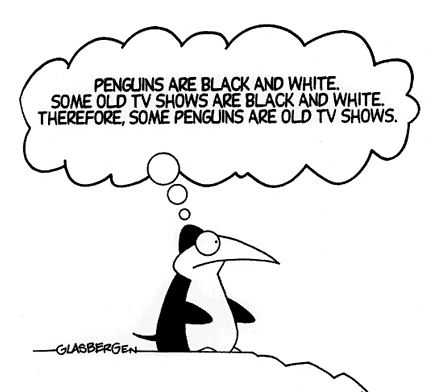
Faulty Syllogism
Note: I wrote this post in February of 2012. The individual I refer to in this post is a person I know in my day-to-day brick and mortar life and not in the autism blogosphere. I re-posted this piece recently in protest of the idea that autism excuses unkind behavior.
-Leigh Merryday, January 2013
I can’t believe I’m actually going to say this. I find myself thinking about syllogisms today. Those of you who endured Logic 101 should remember these.
(Logic. Is it a math? Is it a philosophy? Nobody but this guy seems to know.)
Syllogisms go something like this: All cats have four legs. A table has four legs. Therefore, all cats are tables. This is a false syllogism, in case you haven’t already guessed. In Logic 101, cats can actually be tables. But only in a correct syllogism.
I loved this class, mainly because I got math credit for it. A math class that involved creative and persuasive writing. I loved being able to ignore the words while conclusively proving some silly arguments. The nice thing about logic is that you can whip out a Venn diagram and visually prove or disprove an argument-including some pretty sophisticated ones.
And logic did teach me something. Namely, that we have to be careful about black and white, part or whole kinds of declarations. It’s quite easy to reach the wrong conclusions based upon nothing but personal observation and well-intentioned generalizations.
We do this a lot with regard to autism. You know. Autistic people having superpowers of detail and mathematical genius. Persons with ASD not being able to maintain friendships or show affection. Autistic people having no sense of humor. Etc., etc.
These are annoying stereotypes, to be sure. As parents of ASD kids, we find ourselves constantly having to correct misconceptions about autism. And, often, we find ourselves annoyed with the generalizations of others.
So, then – I ask myself – why are we guilty of doing this ourselves?
I’m going to go ahead and call myself out here. Because I have done exactly what I’m referring to — making generalizations and aiding stereotypes about autism. I have made statements to others along the lines of “Autistic people don’t lie.” I have shared mistaken beliefs about autistics not being overly concerned with what other people think. I have compared my son to an angel, pointing out a lack of malice that seems to accompany autism. And I have not pushed hard enough with autistic kids I know – believing that little in their socially inappropriate behavior was attributable to any fault of their own and seeking to correct other people’s reactions instead. No, I didn’t view autism as a helpless state, but I acknowledge not having done some of the kids any favors by being overprotective and coddling.
Why am I talking about this? Well, I came across an autistic person who happens to be a real jerk. This individual makes obnoxious comments about others. With a malicious gleam in his eye. And thinks it is hilarious to be crude and disgusting to upset others. No, I don’t mean inadvertently. I mean he really thinks it’s funny. He is very smart, and highly verbal. And I found myself trying to be all kinds of sensitive to his differences. I kept trying to justify his rude and deliberate behavior as being manifestations of autistic traits. I kept getting indignantly angry inside at anyone not understanding what drove his behaviors.
And then I had an epiphany. I was thinking about my son and what a calm, laid-back little fellow he is. I have always noticed how much my daughter takes after my husband in her high-energy personality and how much my son is more like my side of the family — uber-mellow. I have been sharing my analogy of analyzing his behaviors – the three sets of glasses – with others for a while as well. Yet, even with this “clarity”, I still failed to make the same leap with other people with autism. I still failed to realize that some behaviors of autistic persons have nothing to do with their autism whatsoever. For even though they have autism, they still have personality elements that are theirs regardless of ASD. And then I realized. The individual I referenced would still be a complete jerk even without his autism. Autism does not negate the natural personality, nor does it blanket the personality with complete goodness. And, I, for all my repeated standing on my autism soapbox – somehow fell into the stereotyping trap.
I forgot that stereotypes are often based upon partial truths. I’m from the South. We abhor stereotypes of us being quirky, ignorant, and intolerant. Yet, we do eat some strange things down here. We are a bit overly friendly and take too much time chit-chatting to accomplish the least little thing. And many of us are so thoroughly pleased with our location that we have little desire to expand our horizons and knowledge of others. (Some of us – not me. I love to travel. Feel free to invite me on your European vacation any time. I’m available.)
Does this make stereotypes okay? Of course not. But, as with logic, you have to make a conscious effort to really look at your argument and determine if it’s valid. In logic and life it is all too easy to get confused by the “alls”, the “somes”, and the “nones”. Very little in life is black and white or any kind of absolute.
Yes, it is true that persons with ASDs are often brutally honest, seeing little purpose in lying to protect social constructs some of them don’t understand. This turns into “wisdom” such as, “An autistic person will never lie.” Hence, a jump from a frequent – not absolute – quality to a stereotype. An easy thing to do even for the well-intentioned. (Take it from someone who has worked with thousands of middle schoolers comprising all sorts of brain wiring. They can lie.)
And here’s the thing. It is an insult to individuals with ASD. If we are going to ask the world to treat people with special needs as individuals, then we must be willing to see them as such. Individuals with strengths. Individuals with weaknesses. And individuals who are sometimes thoroughly unlikable. When we reduce persons with autism spectrum disorders into stereotypes, we place limitations on them. In our attempt to defend and portray them positively, we become guilty of the very same prejudice. We are so fond in the special needs community of saying that our children’s disabilities don’t define them. And then we turn around and call them “angels”. By calling them “angels”, we have defined them. Once we have defined a person, we tend to be inflexible about expanding our definitions. This is a dangerous thing to do when raising, treating, or influencing special needs kids. Because, maybe, just maybe, they might be capable of more than what fits our definition.
 So, with thanks to a complete jerk, I have learned a lesson. Instead of spending my time further professing my son’s angelic qualities, I plan to focus on teaching him to be a good and well-mannered person. Yes, it was in my plans all along, but I found myself making excuses for him and others like him. There is a fine line between noting the unique characteristics of autism and making excuses. One is helpful, and the other is not. I am going to have to do this better. Because, one day, I don’t want anyone to have any epiphanies about him.
So, with thanks to a complete jerk, I have learned a lesson. Instead of spending my time further professing my son’s angelic qualities, I plan to focus on teaching him to be a good and well-mannered person. Yes, it was in my plans all along, but I found myself making excuses for him and others like him. There is a fine line between noting the unique characteristics of autism and making excuses. One is helpful, and the other is not. I am going to have to do this better. Because, one day, I don’t want anyone to have any epiphanies about him.
Here is a syllogism that works:
All human beings are unique persons with both positive and negative qualities.
All persons with autism are human beings.
Therefore all persons with autism are unique persons with both positive and negative qualities.
See Professor What’s-Your-Name? I did learn something in your class. Funny that the test didn’t come for 20 years.



